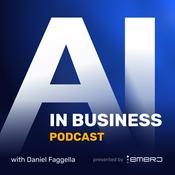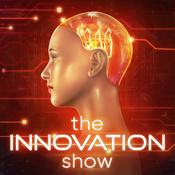82 episodes
- Local government faces challenge implementing generative AI ethically whilst maintaining public trust and data security as new EU AI Act regulations require basic AI literacy training for staff.
Khizer Ahmed Biyabani, researcher with ADAPT at Trinity College Dublin and 2025 Digital
Transformation Rising IT Star winner, alongside Richie Shakespeare, assistant staff officer Dublin City Council, explain Ireland's first local government generative AI Lab translating academic research into practical ethical AI tools, how retrieval model analysing council meeting minutes avoids hallucinations by training only on specific datasets preventing New South Wales Australia confusion, why four pillars covering governance, education, proof of concepts and enterprise scaling create systematic approach, and how smart gully life buoy monitoring sensors demonstrate broader Smart Cities innovation culture.
Khizer Ahmed Biyabani is researcher with ADAPT at Trinity College Dublin recently winning Rising IT Star in Public Sector Award at 2025 Digital Transformation and AI Awards. Co-leading Ireland's first local government generative AI Lab translating academic research into ethical practical AI tools for public services, he runs Explain IT workshops with colleague Claudia Bailey from Smart Documents under Academy Near Future programme at Connect Resource Centre providing basic AI literacy training required by EU AI Act Article Four.
Richie Shakespeare is assistant staff officer in Dublin City Council working within Smart Cities tech innovation section examining new emerging technologies, innovative processes and collaboration models making city operate smarter. Co-leading local government generative AI Lab partnership with ADAPT Centre at Trinity College Dublin, he focuses on internal process improvements identifying pain points staff experience whilst maintaining ethical considerations around data sensitivity and personal information protection.
Connect with the Gen AI Lab:
Website: www.adaptcentre.ie
ADAPT Centre at Trinity College Dublin
Dublin City Council Smart Cities Division
MORE INFORMATION
You can learn more about the Sea-Scan project and other cutting-edge research at Trinity College Dublin's ADAPT Centre here: www.adaptcentre.ie/
Adapt Radio is produced by DustPod.io for the ADAPT Centre
For more information about ADAPT's groundbreaking AI and data analytics research visit www.adaptcentre.ie/ - Teachers face overwhelming preparation burden as global education shifts toward personalised learning and outcomes based curricula without adequate infrastructure support creating fragmented system between teachers, students, school leaders and departments.
Dr Chris Byrne, founder and CEO of MESO offering intelligent planning software for teachers supported by Enterprise Ireland and ADAPT Centre Trinity College Dublin with PhD focused on curriculum change, explains why leaked UK government report showed 25% teachers considering quitting due planning burden requiring reducing class contact hours costing physical resources, how personalised education demands knowing 30 to 40 students' individual learning needs without providing additional time or infrastructure, why outcomes based education replaced topic textbook model with broad learning statements containing active verbs like discuss and investigate developing 21st century skills, and how AI enables creating unit plans, lesson plans, rubrics and success criteria whilst human teachers excel at predicting task duration where LLMs prove terrible.
THINGS WE SPOKE ABOUT
Teachers face overwhelming preparation burden personalised outcomes based education without adequate infrastructure fragmented system
Leaked UK government report twenty five percent teachers considering quitting planning burden physical resource constraints
Outcomes based education replaced topics with learning statements active verbs discuss investigate twenty first century skills
GUEST DETAILS
Dr Chris Byrne is Founder and CEO of MESO creating education planning software empowering teachers, students and school leaders through adaptive tools enhancing teaching and learning fostering environment where every learner can thrive. Supported by Enterprise Ireland commercialisation funding and partnering with Trinity College ADAPT Centre, world leading SFI Research Centre for AI-Driven Digital Content Technology, ensuring MESO at forefront of education innovation.
Holding Postgraduate Diploma in Education Management from National University Ireland Maynooth and PhD from Trinity College Dublin where research focused on curriculum change, he brings perspective as former teacher with extensive classroom experience understanding planning burden firsthand. Active contributor to global conversation on education reform regularly speaking at national and international conferences sharing insights on curriculum innovation, adaptive learning technologies and educational transformation with research published in leading academic journals shaping contemporary discussions on effective education strategies influencing policy and practice in educational institutions worldwide.
Connect with Dr Chris Byrne:
Website: mesolab.ai
ADAPT Centre: www.adaptcentre.ie
Enterprise Ireland Commercialisation Funding
Trinity College Dublin - When your AI agent books a rental car, it needs your driver's license, credit card, calendar access and permission to message your contacts—creating what Meredith Whittaker calls "fundamental backdoor" threatening apps like Signal.
At ADAPT ADVANCE 2025, Signal Foundation President and AI Now Institute co-founder Meredith Whittaker joined Dr Abeba Birhane for a fireside chat dissecting why "bigger is better" serves hyperscaler monopolies not evidence.
How AI companions weaponise 1970s Eliza manipulation psychology on minors, why "open source AI" became marketing arbitrage exploiting software community goodwill, and what sovereign AI actually requires beyond anxiety signifiers—including democratic governance, trusted local data, and answers to "who owns deployment infrastructure?"
THINGS WE SPOKE ABOUT
* “Bigger is better" AI myth protects hyperscaler monopolies, not users
* Agentic AI demands sweeping permissions creating existential privacy backdoor threats
* AI companions weaponize known psychological manipulation tactics against vulnerable minors
* "Open source AI" exploits software community goodwill without delivering benefits
* Sovereign AI requires democratic governance beyond geopolitical anxiety signaling today
GUEST DETAILS
Meredith Whittaker is President of the Signal Foundation and co-founder of the AI Now Institute—one of the most trusted voices in AI ethics, transparency and accountability. Her decade of work has profoundly shaped ethical AI frameworks, bringing impact from academia to industry.
At Google, Meredith was core organizer for the 2018 Google Walkouts where over 20,000 employees protested military AI use (Project Maven), surveillance, and sexual misconduct—forcing Google to discontinue their military contract and oust implicated VPs.
As AI Now Institute co-founder, her research cuts through AI hype, grounding discussions on what truly matters: power concentration, labour exploitation in AI pipelines, and protecting fundamental rights including privacy and rule of law.
Her work exposes corporate capture, debunks "bigger is better" myths, reveals sustainability costs, and provides foundational open source research.
Meredith has provided congressional testimony to US Congress and leads Signal—one of the most trusted privacy-friendly messaging apps. Her background building large-scale network measurement systems at Google gives her unique expertise in data quality, evaluation criteria manipulation, and how benchmark gaming serves hyperscaler interests over real-world effectiveness.
Dr Abeba Birhane is founder and director of the AI Accountability Lab at Trinity College Dublin. Her groundbreaking research examines AI datasets, uncovering how larger datasets contain higher hateful content and pornography—debunking "bigger dissipates problems" assumptions.
Her work on benchmarks and measurement demonstrates that purpose-built smaller models often outperform larger models in real-world contexts with appropriate contextual data.
Connect with the guests:
* Signal Foundation: signal.org
* AI Now Institute: ainowinstitute.org
* AI Accountability Lab: Contact through ADAPT Centre
* Follow their research and writing on AI accountability
MORE INFORMATION
You can learn more about the Sea-Scan project and other cutting-edge research at Trinity College Dublin's ADAPT Centre here: www.adaptcentre.ie/
Adapt Radio is produced by DustPod.io for the ADAPT Centre
For more information about ADAPT's groundbreaking AI and data analytics research visit www.adaptcentre.ie/
KEYWORDS
#TrustedAI #AIaccountability #AIprivacy #AIgovernance #MeredithWhittaker - Ireland's territorial waters are among Europe's largest, yet monitoring this vast maritime expanse for unauthorized vessels, environmental threats, and infrastructure protection remains an enormous challenge with current surveillance technologies.
Professor Marco Ruffini and Dr. John Kennedy from Trinity College Dublin have developed Sea-Scan, a revolutionary system that transforms existing undersea telecommunications cables into comprehensive acoustic monitoring networks. Using distributed acoustic sensing and AI, their technology can detect and classify vessels across hundreds of kilometers of ocean using just one land-based device.
THINGS WE SPOKE ABOUT
● Transforming existing fiber optic cables into underwater sensor networks
● AI detection of "dark vessels" that disable identification beacons
● Unique acoustic signatures for different vessel classifications
● Marine ecosystem monitoring and shipping noise impact assessment
● Real-time infrastructure protection from accidental damage
● Cost-effective surveillance across Ireland's vast territorial waters
GUEST DETAILS
Professor Marco Ruffini is Associate Professor and Fellow of Trinity College Dublin and Principal Investigator of both the CONNECT Telecommunications Research Centre and the IPIC Photonics Integration Centre. He specializes in optical network architecture at the Department of Computer Science and Statistics, focusing on converged metro/access network architecture, long-reach passive optical networks, and inter-data center connectivity. His expertise spans over two decades in optical communications and fiber sensing technologies.
Dr. John Kennedy is Associate Professor in Vibrations, Acoustics and Dynamics at Trinity College Dublin. His current research centers on the use of advanced additive manufacturing techniques to design and fabricate novel acoustic metamaterials for environmental noise control. His research focuses on acoustics, noise control, aeroacoustics, additive manufacturing, and metamaterials, making him uniquely positioned to interpret underwater acoustic signals.
MORE INFORMATION
You can learn more about the Sea-Scan project and other cutting-edge research at Trinity College Dublin's ADAPT Centre here: www.adaptcentre.ie/
Adapt Radio is produced by DustPod.io for the ADAPT Centre
QUOTES
Having this many sensors in this environment helps us monitor activity that's happening in our waters. - John Kennedy
Just by placing one device at one end of the fiber, I had a microphone every meter, so I can get a different sound every meter for all the 100 kilometers just with one device at one end. - Marco Ruffini
This technology gives you a kind of unparalleled resolution of sensors underwater. It allows you to investigate questions that you know are very important for various different reasons. - John Kennedy
You won't believe how often fiber gets cut due to digging... you could detect the noise of the vehicle that's trying to dig, and you could contact them, maybe 10 to 15 minutes in advance. - Marco Ruffini
One of the exciting things about working in acoustics is that it sort of touches all aspects of human activity and also our daily lives." - John Kennedy
KEYWORDS
#distributedacousticsensing #marinesurveillance #fiberoptics #underwateracoustics #AImonitoring - Ireland is facing a housing crisis, and yet countless buildings sit empty and unused.
In this episode of Adapt Radio, Dr. Clare O’Connell speaks with Dr. Philip Crowe and Milo Dennehy from University College Dublin about a bold, AI-driven project to map and tackle building vacancy across the country.
Discover why data on empty buildings is so patchy, how new tech could unlock hidden opportunities for homes and communities, and why solving this puzzle means more than just better spreadsheets.
From town centre revitalisation to the surprising power of open data, this conversation explores how AI might help Ireland turn vacancy into vibrant possibility.
THINGS WE SPOKE ABOUT
● Why Ireland’s empty buildings are so hard to track
● How AI and data science are changing the vacancy game
● The challenges, and surprises, of sharing property data
● What Ireland can learn from France, Philadelphia, and beyond
● Transforming vacant spaces into vibrant communities
GUEST DETAILS
Dr Philip Crowe is UCD Assistant Professor for Climate Responsive Design at the School of Architecture, Planning and Environmental Policy (APEP) and the School of Civil Engineering.
He is the Director of Research at UCD APEP, co-director of the UCD Centre for Irish Towns, and Programme Director of the MSc in Architecture, Urbanism and Climate Action. Philip teaches in areas relating to carbon management, sustainability, urban resilience and urban ethics.
As a researcher, he is working on a range of EU and nationally funded projects relating to town revitalisation, vacancy and adaptive reuse, compact urban growth, and citizen participation in processes of change. Philip’s background is in architecture, and he was previously Director of Sustainable Design at M.CO (Dublin) from 2003-2012.
Milo Dennehy is a Research Assistant in the School of Computer Science. Milo is a current student in the BSc City Planning and Environmental Policy programme, set to graduate in 2025. Before joining Building Stories, Milo was a research assistant in the School of Architecture, Planning and Environmental Policy at UCD. His research interests are in building geospatial tools that leverage machine learning and remote sensing techniques to enhance capacity and reduce the barriers to access to geospatial technology for local actors.
MORE INFORMATION
You can learn more about your AI Literacy in the Classroom here: https://ai-literacy-in-the-classroom.adaptcentre.ie/
Adapt Radio is produced by DustPod.io for the Adapt Centre
For more information about ADAPT visit www.adaptcentre.ie/
QUOTES
We don’t actually know what we’re dealing with—how do you manage your built environment without reliable, dynamic data? – Dr Philip Crowe
It shocked me how much decision-making still relies on throwing darts at the map and manual guesswork – Milo Dennehy
If you aggregate all these data sets together, you’ve got something incredibly powerful to solve the housing crisis – Dr Philip Crowe
AI lets us see what’s missing in the data—and predict what’s possible for Ireland’s empty buildings. – Milo Dennehy
The real challenge isn’t technical—it’s about building trust and a culture of sharing data for the public good. – Dr Philip Crowe
KEYWORDS
#AI #VacantBuildings #IrelandHousing #DataScience #UrbanRevitalisation #SmartCities #OpenData #HousingCrisis #PropertyData #CommunityImpact #TownCentres #DataGovernance #SustainableCities #Innovation #TechForGood
More Technology podcasts
Trending Technology podcasts
About ADAPT Radio
ADAPT, the world-leading SFI Research Centre for AI-Driven Digital Content Technology, brings leading academics, researchers and industry partners together to deliver excellent science, engage the public, develop novel solutions for business across all sectors and enhance Ireland’s international reputation.
Podcast websiteListen to ADAPT Radio, Shell Game and many other podcasts from around the world with the radio.net app

Get the free radio.net app
- Stations and podcasts to bookmark
- Stream via Wi-Fi or Bluetooth
- Supports Carplay & Android Auto
- Many other app features
Get the free radio.net app
- Stations and podcasts to bookmark
- Stream via Wi-Fi or Bluetooth
- Supports Carplay & Android Auto
- Many other app features


ADAPT Radio
Scan code,
download the app,
start listening.
download the app,
start listening.






































